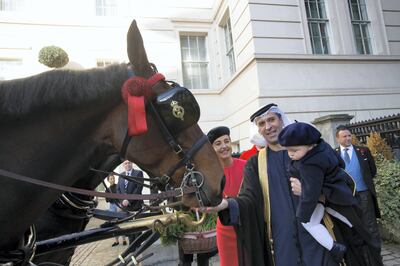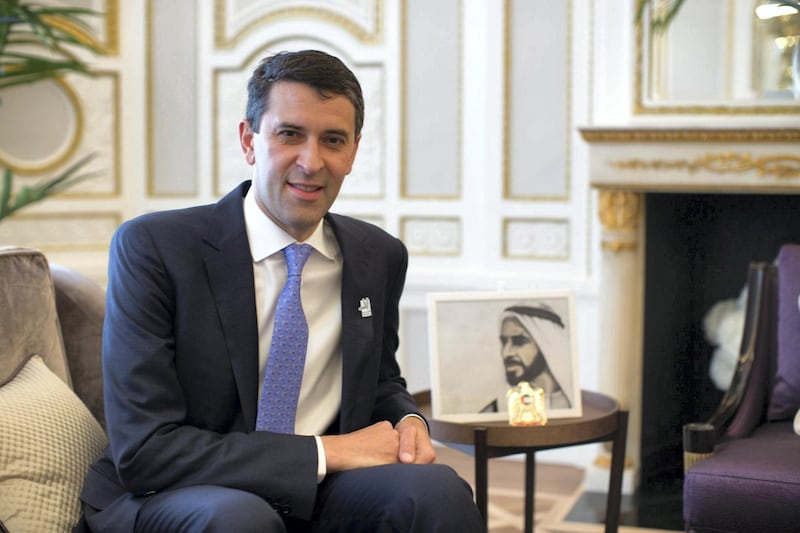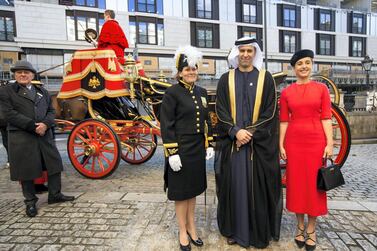Like so many other people, I have been working from home for nearly two months now.
I rarely have the pleasure of going into our beautiful embassy in London's Belgravia since we closed it to visitors in March as a precaution against the spread of Covid-19.
And I have not been able to gather together with my entire team for our regular discussions about the work of the embassy.
All of which has made the traditional work of diplomacy incredibly challenging.

So much of what diplomats do is about networking and making new connections. A chance encounter with someone at an event can be as useful as a formal meeting set up weeks in advance.
In the world before Covid-19 I would typically drop in on a function most evenings, after a full day of meetings in and out of the office, plus regular travel outside London.
Today, I don't stray more than a few metres from my desk at home. And everyone I meet is confined to the little rectangle of Zoom and Microsoft Teams.
We have had to make the most of these technologies.
At the outset of the crisis video-conferencing enabled the embassy team to continue to work seamlessly together as they managed a huge surge of demand for our services.
Thousands of Emirati citizens, some with critical medical conditions, had to be repatriated from the UK.
British residents of the UAE wanted information about how they could return home. British travellers the world over were hoping to travel to the UK via the UAE.
These repatriation efforts are ongoing.
We had important work to do – via the UAE-UK Business Council – in reassuring investors that the UAE is doing all it can to prepare for a fast economic recovery.
🇦🇪Today, at Buckingham Palace, Her Majesty held an Audience in which she received the new UAE Ambassador to the UK, His Excellency Mr Mansoor Abulhoul.
— The Royal Family (@RoyalFamily) November 13, 2019
Mrs Victoria Devin was also received by Her Majesty. pic.twitter.com/m9WvnODofI
And we facilitated the handover of much needed medical supplies donated by the UAE to the UK.
For all these issues, our digital channels were invaluable for helping put out information.
Social media has become even more important whilst everyone is cooped up at home. We're using it to try and reach out to policy makers, opinion formers and regular members of the British public.
We want to reach the widest possible audience, so we can continue to tell the remarkable story of the UAE.
Many people currently have more time for such engagement. There have been fascinating Zoom webinars run by the Emirates Society (a UK-UAE friendship group), including one session on the history of the Emirates.
I am also determined to meet new people and strike up new friendships.
Early in lockdown, I had an excellent conference call with the British Board of Deputies, the venerable body that represents the UK's Jewish communities. It was a warm meeting, and we all agreed to a non-virtual gathering as soon as possible.
Before Ramadan, we threw a virtual dinner for various Members of Parliament, none of whom I had met before.
Normally they would have come to my house for dinner. In an effort to sustain traditional Emirati hospitality, we offered to deliver food to our guests in their homes.
Most of them preferred to cook themselves, and so we made a donation instead to a charity that gives meals to Britain's hard working doctors and nurses.
It was a great success. In some ways the novelty of the occasion helped to break the ice. One member of parliament even dressed up in a dinner jacket and emblazoned the background of his Zoom screen with an Emirati flag.
Thanks to the UAE’s Higher Committee of Human Fraternity all
— UAE Embassy UK (@UAEEmbassyUK) May 14, 2020
the world’s religions are coming together today to #PrayForHumanity, as part of
our collective fight against Covid19. https://t.co/uEdcSN4USS
I have had many other excellent conversations from the comfort of my study. And, despite the best efforts of my young son Zayed, I have not yet had to suffer the fate of Robert Kelly, the South Korea expert famously interrupted mid-BBC interview by his children.
Curiously, life feels busier now than it did before. Time saved on travelling around can be spent on packing in more virtual meetings. The discussions often feel more intense. We have been engaging with British government ministers on everything from technology partnerships to the future of education.
I certainly don't seem to have any extra free time. It is an unusual day that I get out of the house, except on the weekends when I go for a walk in the park with my family. As my waistline will attest, I rarely even get to jump on my exercise bike.
For all that Zoom, Twitter and Instagram have changed the way we work in recent weeks, none of them are as powerful as old-fashioned, face-to-face diplomacy.
An entire programme of events and activities has been put on ice. That includes the next stage of my personal mission to travel the full length of the British Isles by bicycle (I was due to tackle the southern half of Scotland this summer).
But these exciting events have merely been postponed, not cancelled. We will be returning to them with gusto the moment we can.
There is enormous pent up demand for traditional diplomacy.
I am looking forward to the return to normality – and getting back to the office.
Mansoor Abulhoul is the UAE Ambassador to the UK






